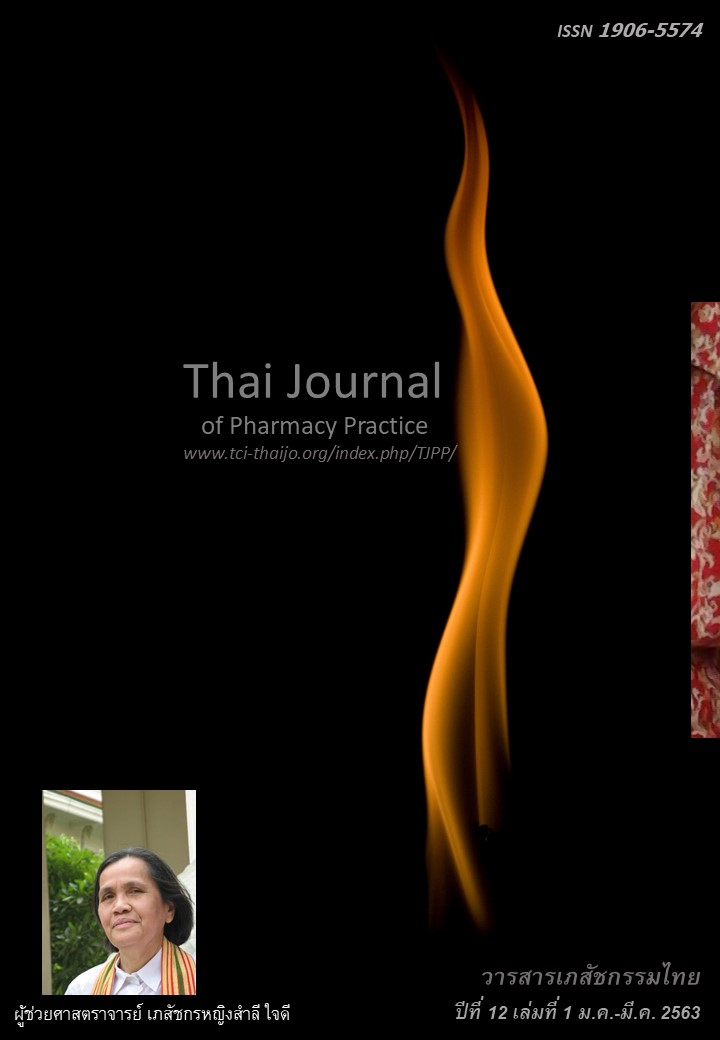ปัจจัยที่มีผลต่อการยอมรับวัคซีนไข้เลือดออกของผู้ป่วยที่มารับบริการที่โรงพยาบาลแห่งหนึ่งในจังหวัดยะลา
Main Article Content
บทคัดย่อ
วัตถุประสงค์: เพื่อศึกษาการยอมรับวัคซีนไข้เลือดออกและปัจจัยที่มีความสัมพันธ์กับการยอมรับดังกล่าวของผู้มารับบริการในแผนกผู้ป่วยนอกของโรงพยาบาลแห่งหนึ่งในจังหวัดยะลา วิธีการ: การศึกษานี้เป็นการวิจัยเชิงพรรณนาภาคตัดขวาง ผู้วิจัยสัมภาษณ์ผู้มารับบริการในแผนกผู้ป่วยนอกของโรงพยาบาลแห่งหนึ่งในจังหวัดยะลาจำนวน 400 คน แบบสอบถามที่ใช้สัมภาษณ์ประกอบด้วยคำถามที่ประเมินเจตคติเกี่ยวกับโรคไข้เลือดออก เจตคติเกี่ยวกับวัคซีนไข้เลือดออก และ การยอมรับวัคซีนไข้เลือดออก ผลการวิจัย: ตัวอย่างร้อยละ 95.0 ยอมรับวัคซีนไข้เลือดออก ค่ามัธยฐานของความเต็มใจจ่ายวัคซีนไข้เลือดออก 3 เข็มอยู่ที่ 550 บาท (พิสัยระหว่างควอไทล์ 277.5, 1,000.0) ตัวอย่าง 6 รายไม่ประสงค์ที่จะจ่ายค่าวัคซีนไข้เลือดออก การวิเคราะห์ด้วย logistic regression พบว่า ปัจจัยที่มีความสัมพันธ์กับการยอมรับวัคซีนไข้เลือดออกอย่างมีนัยสำคัญทางสถิติได้แก่ การมีวัคซีนบริการให้ฟรี (OR=35.93, 95% CI: 10.82-119.31) ความรุนแรงของโรคไข้เลือดออก (OR=7.75, 95% CI: 1.93-31.02) และอิทธิพลจากบุคคลในครอบครัว (OR=4.76, 95% CI: 1.26-18.02) สรุป: ตัวอย่างเกือบทั้งหมดยอมรับวัคซีนไข้เลือดออก ปัจจัยที่มีความสัมพันธ์ต่อการยอมรับวัคซีนไข้เลือดออกคือ ควรมีวัคซีนมีบริการฟรี ความคิดเห็นต่อความรุนแรงของโรคไข้เลือดออก และอิทธิพลจากบุคคลในครอบครัว การป้องกันโรคไข้เลือดออกโดยวัคซีนต้องเข้าใจปัจจัยต่างๆ ที่สัมพันธ์ต่อการยอมรับวัคซีนไข้เลือดออก บทบาทของเจ้าหน้าที่สาธารณสุข คือ การให้ข้อมูลความรุนแรงของโรค การสนับสนุนวัคซีน และการทำความเข้าใจกับบุคคลในครอบครัว
Article Details
ผลการวิจัยและความคิดเห็นที่ปรากฏในบทความถือเป็นความคิดเห็นและอยู่ในความรับผิดชอบของผู้นิพนธ์ มิใช่ความเห็นหรือความรับผิดชอบของกองบรรณาธิการ หรือคณะเภสัชศาสตร์ มหาวิทยาลัยสงขลานครินทร์ ทั้งนี้ไม่รวมความผิดพลาดอันเกิดจากการพิมพ์ บทความที่ได้รับการเผยแพร่โดยวารสารเภสัชกรรมไทยถือเป็นสิทธิ์ของวารสารฯ
เอกสารอ้างอิง
2. World Health Organization. Dengue and dengue hemorrhagic fever [online]. 2017 [cited Oct 15, 2017]. Available from: /www.who.int/mediacentre/ fact sheet s/fs117/en/index.html.
3. Department of Disease Control, Ministry of Public Health. Dengue fever forecast report, Dengue fever situation [online]. 2018. [cited Feb 21, 2019]. Avai lable from: ddc.moph.go.th/th/site/newsview/view/6 96.
4. Shepard D. Economic and disease burden of dengue in Southeast Asia. Plos Neg Trop Dis 2013;7:e2055.
5. World Health Organization. Globle strategy for dengue prevention and control 2012-2020 [online]. 2012. [cited Nov 1, 2017]. Available from: www.who .int /immunization/sage/meetings/2013/april/5_D engue_SAGE_Apr2013_Global_Strategy.pdf.
6. Hadinegoro SR, Arredondo-Garcia JL, Capeding MR, Deseda C, Chotpitayasunondh T, Dietze R, et al. Efficacy and long-term safety of a dengue vaccine in regions of endemic disease. N Eng J Med 2015; 373: 1195-206.
7. Pediatric Infection Disease Society of Thailand. Guidelines for guidance in the practice of dengue vaccine: Dengvaxia advice for doctors. [online]. 2017 [cited Dec 29, 2017]. Available from: www.pid st.or.th/A601.html.
8. Nokdee C. Dengue Vaccine: Prevent disease from mosquitoes [online]. 2017 [cited Oct 30, 2017]. Ava ilable from: www.thaihealth.or.th.
9. Villar L, Dayan GH, Arredondo-García JL, Rivera DM, Cunha R, Deseda C, et al. Efficacy of a tetrava lent dengue vaccine in children in Latin America. N Eng J Med 2015; 372: 113-23.
10. World Health Organization. Questions and answers on dengue vaccines: Phase III study of CYD-TDV in Latin America [online]. 2014. [cited Oct 1, 2017]. Available from: www.who.int/immunization/research /development/QA_Dengue_vaccine_LA_phIIIstudy_final.pdf.
11. Harapan H, Anwar S, Setiawan AM, Sasmono RT. Dengue vaccine acceptance and associated factors in Indonesia: A community-based cross-sectional survey in Aceh. Vaccine. 2016; 34: 3670–5.
12. Panji FH, Marcia C. Public acceptance and willing ness to pay for a future dengue Vaccine. Plos Neg Trop Dis 2013;7:e2427.
13. Becker MH. The health belief model and personal health behavior. Health Educ Monogr 1974;2:324–508.
14. Sooksripeng B. Health belief model [online]. 2013 [cited Oct 10, 2017]. Available from: www.gotokno w.org/posts/115420.
15. World Health Organization. What influences vaccine acceptance: A model of determinants of vaccine hesitancy [online]. 2013. [cited Oct 1, 2017 ]. Available from: www.who.int/ immunization/ sage /meetings/2013/april/1_Model_analyze_driversofvaccineConfidence_22_March.pdf.
16. Barbacariu CL. Parents’ refusal to vaccinate their children: An increasing social phenomenon which
threatens public health. Procedia Soc Behav Sci 2014;149:84–91.
17. Harmsen IA, Mollema L, Ruiter RA, Paulussen TG, de Melker HE, Kok G. Why parents refuse childhood vaccination: a qualitative study using online focus groups. BMC Public Health 2013; 13: 1183.
18. Fredrickson DD, Davis TC, Arnould CL, Kennen EM, Hurniston SG, Cross JT, et al. Childhood immu nization refusal: provider and parent perceptions. Fam Med 2004; 36: 431–9.
19. Yaqub O, Castle-Clarke S, Sevdalis N, Chataway J. Attitudes to vaccination: a critical review. Soc Sci
Med 2014; 112: 1–11.
20. Jung-Seok L, Vittal M, Lim JK, Mabel C, Chukiat S, Anh DD, Lee KS, et al. A multi-country study of the
household willingness-to-pay for dengue vaccines: Household surveys in Vietnam, Thailand, and Colombia. PloS Neg Trop Dis 2015;9:e0003810.


